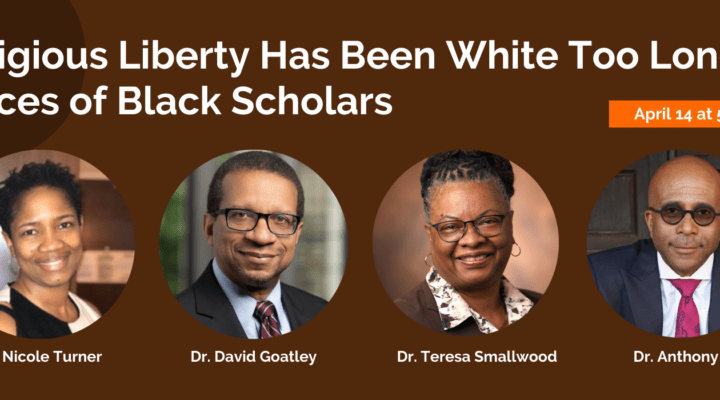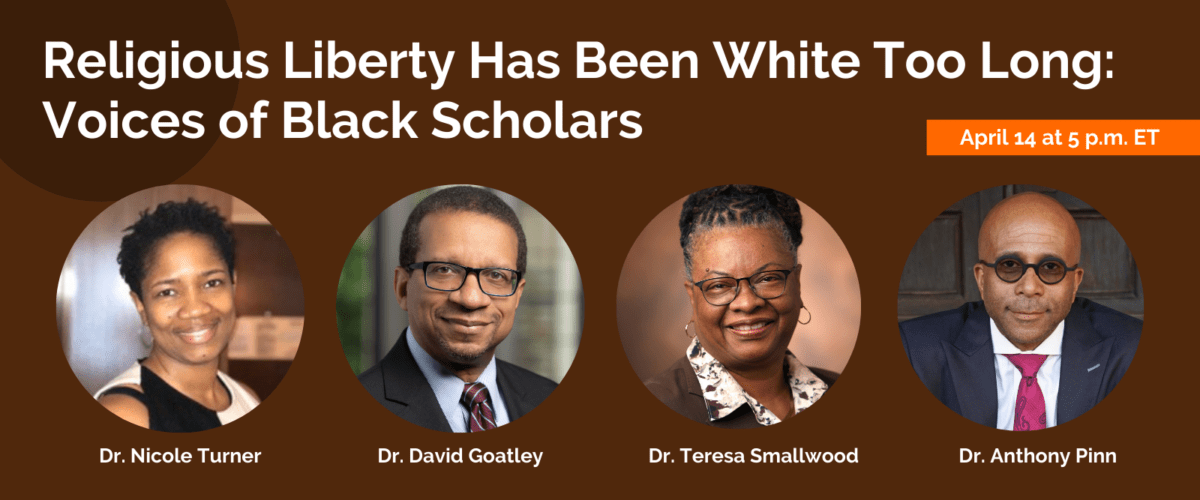Critical Race Theory, the continued racial segregation of U.S. churches and the need to include African Americans more fully in religious liberty campaigns were among the topics discussed during “Religious Liberty Has Been White Too Long: Voices of Black Scholars,” hosted April 14 by Baptist Joint Committee for Religious Liberty.
The virtual conversation was presented as BJC’s 2021 Shurden Lectures on Religious Liberty and featured four Black scholars who offered brief lectures and answered viewer questions read by event moderator Charles Watson Jr., BJC director of education.
The speakers were Teresa Smallwood of Vanderbilt University Divinity School, Anthony Pinn of Rice University, Nicole Turner of Yale University, and David Goatley of Duke Divinity School.
Critical Race Theory
One of the questions referenced white evangelicals’ criticism of Critical Race Theory as invalid and incompatible with the life and teachings of Christ and recently condemned by Southern Baptist seminary presidents.
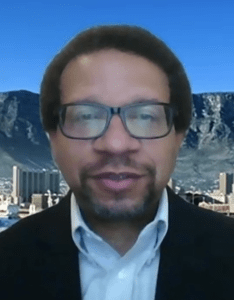
David Goatley
Goatley, research professor of theology and Black church studies at Duke and the author of Were you There: Godforsakenness in Slave Religion, responded by turning the challenge back on critics of the theory, which is an effort to critically examine how issues of race intersect with law, government and society.
“It sounds to me like these critiques are coming from people who have not read the material,” Goatley said. “It’s the depth of intellectual bankruptcy to claim to be an intellectual leader and make the kind of critiques that they’re making.”
Efforts to refute Critical Race Theory represent part of the larger attack on truth and justice that has gained prominence in the United States, said Smallwood, associate director of Vanderbilt Divinity School’s Public Theology and Racial Justice Collaborative.
“The same illogic that would give us fake news and would say that Donald Trump won the election. It is the same illogic that would contend that Antifa was in charge of the Jan. 6 insurrection,” she said. “In other words … this is not an intellectual analysis at all. This is a gatekeeping.”
“This is not an intellectual analysis at all. This is a gatekeeping.”
Instead, the theory provides a framework from which Americans can be “real with one another” through open research and dialogue, Smallwood said. The theory provides a path to fair policies that can be developed in a nation currently torn by racial strife.
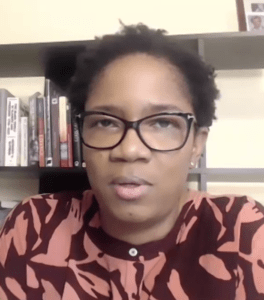
Nicole Turner
Critical Race Theory also creates understanding about how that tension has come about, said Turner, associate professor of religious studies at Yale and the author of Soul Liberty: The Evolution of Black Religious Politics in Postemancipation Virginia.
The framework clarifies how the institution of slavery has shaped the lives of Blacks throughout American history and can offer perspective to anyone regardless of race, Turner said. “There is so much to be said for trying to understand the world … through the eyes of someone else.”
Attacking Critical Race Theory is nothing more than an attempt to mislead, said Pinn, professor of humanities at Rice University and author of several books, including Humanism: Essays in Race, Religion, and Cultural Production.
“To deny that is to tell a lie,” he said. “This is clearly a critique that is meant to safeguard the status quo.”
Blacks and religious liberty
Another way to generate comprehensive views on race is to include Black perspectives in religious liberty discussions, the four scholars agreed.
All too often, those conversations occur “on the extremes” among white people and in white churches, Goatley said. If and when Black leaders are consulted, its’s after key concepts have been agreed on by white organizers.
“Black perspectives on religious liberty are diverse, but they need to be considered.”
“The agenda has often been set prior to engaging them (Black leaders) in conversation or including them in meetings, and by the time they get to the table, the information is already being disseminated,” he said.
Goatley praised BJC for its approach to religious liberty but also reiterated the critical need for racial inclusion from the beginning of all discussions. “Black perspectives on religious liberty are diverse, but they need to be considered.”
Racially diverse discussions can be edgy because they include uncomfortable, challenging and provocative perspectives, Turner said.
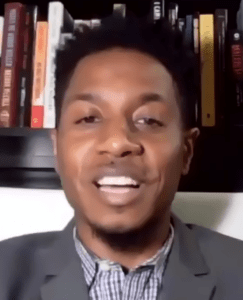
Charles Watson Jr.
BJC recognizes the importance of “having African Americans at the table at the beginning, end and throughout the conversation,” Watson said. (BJC is supported by 16 partner organizations, including four of the historic Black Baptist denominations and one historic Hispanic Baptist convention.)
Racial divisions in churches
Watson asked if the end-goal of racial justice and religious liberty work would — or should — eventually culminate in an end to racially divided churches.
Turner said that would require an acknowledgment of the historic and ongoing wrongs committed against Blacks. “That would be a starting point to being able to come together.”
Goatley, however, challenged the notion that there needs to be an integration of American churches. While it may be true that 11 a.m. Sunday is highly segregated, so are the times when people are at work or at school.
“There is no reason to try to eliminate … cultural familiarity” within churches. “I don’t see a problem with people congregating where they are able to grow and to be challenged and to serve,” he said.“I don’t see diversity as a problem. I see it as a positive thing. My resistance is when people practice religion in a way that demonizes others and that diminishes life and livelihood.”
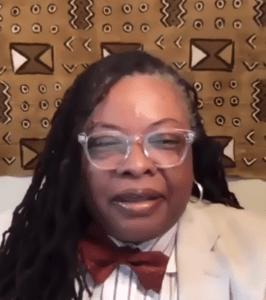
Teresa Smallwood
Smallwood compared these situations to the New Testament account of the tearing of the veil in the temple.
“The symbol of the veil has particular meaning for religions, generally, and for Black religions, in particular,” she said. The latter context alludes to striving to expose and remove systemic efforts to deny Black people their fundamental rights. “The U.S. Constitution was considered one of the vehicles they would use to tear that veil from top to bottom,” Smallwood said about earlier generations of Black leaders.
The tearing of the veil also reflects “fighting mythical white supremacist ideations from Charlottesville to Capitol Hill and all points in between such as Mother Emmanuel Church or the public street in Minneapolis, Minn., where George Floyd took his last breath,” she added.
The effort began with enslaved Blacks seeking freedom of worship and continues through present-day protest movements, Smallwood said. “African Americans have summoned dogged strength to unleash the power from within to break down barriers to full faith and citizenship,”
The struggle also has been captured in W.E.B. Du Bois’ historic response to the question of how Blacks feel about being “problems” in their own nation, Pinn said.
“’How does it feel to be a problem?’ is a question that guides the cultural constructions that mark the life and geography of Black communities. This is the question that undergirds the very construction of blackness within the context of what becomes the United States. It marks the very beginning of our presence here to the contemporary moment.”
Another way to ask the question, Pinn said, is: “How does it feel to be marginalized and to be of no real consequence in this nation?”
Related articles:
SBC seminary presidents meet with Black pastors but don’t change position on Critical Race Theory
Southern Baptists need a vaccine for racism
Could you win a quiz show by defining ‘Critical Race Theory’?
Southwestern president says SBC seminary leaders have been ‘misunderstood’ and ‘misconstrued’
SBC seminary presidents are ‘complicit with evil,’ revered California pastor says
SBC seminary presidents are propagating fear to maintain control | Laura Levens
Is it time for Black Christians to give up on the SBC? | Corrie Shull
How I learned to name my oppression — and my privilege | Meredith Stone
Please listen to my friend Ralph West about racism and the SBC | Joel Gregory

